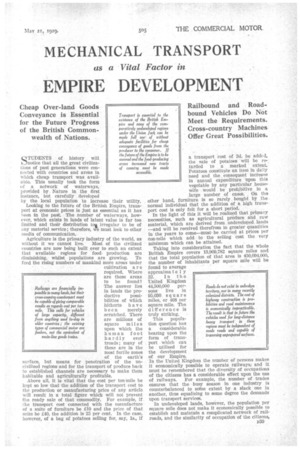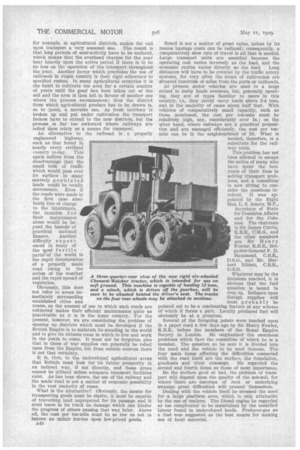MECHANICAL TRANSPORT
Page 65

Page 66

If you've noticed an error in this article please click here to report it so we can fix it.
as a Vital Factor in
EMPIRE DEVELOPMENT
STUDENTS of history will notice that all the great civilizations of past generations were conneoted with countries and areas in which cheap transport was available. This usually took the form of a network of waterways, provided by Nature in the first instance, but carefully developed by the local population to increase their utility.
Looking to the future of the British Empire, transport at economic prices is just as essential as it has been in the past. The number of waterways, however, which exists in lands of latent value is far too limited and their distribution tot irregular to be of any material service; therefore, we must look to other media of communication.
Agriculture is the primary industry of the world, as without it• we cannot live. Most of the civilized countries are now being built over to such an extent that available regions for foodproduction are diminishing, whilst populations are growing. To feed the rising numbers of mankind more areas under cultivation a r e required. Where are these areas to be found?
• The answer lies in lands the pro
ductive possibilities of which hitherto ha v e been merely scratched. There are millions of square miles upon which the human foot hardly ever treads; many of these are in the most fertile zones
• of the earth's surface, but means for penetration of the uncivilized regions and for the transport of produce back to established channels are necessary to make them habitable and agriculturally profitable.
Above all, it is vital that the cost per ton-mile be kept so low that the addition of the transport cost to the production or manufacturing price of any article will result in a total figure which will not prevent the ready sale of that commodity. For example, if idle transport cost connected with the manufacture of a suite of furniture be £10 and the price of that suite be £40, the addition is 25 per cent. In the case, however, of a bag of potatoes selling for, say, 1s., if
a transport cost of 3d. be addcd, the sale of potatoes will be retarded to . a marked ' extent. Potatoes constitute an item in daity need and the. consequent increase in annual expenditure upon this vegetable by any particular house
wife would be prohibitive in a
large number of cases. On the other hand, furniture is so rarely bought by the normal individual that the addition of a high transport cost is only felt for a short period.
In the light of this it will be realized that primary necessities, such as agricultural produce and raw material, which are derived from., undeveloped. and, —and will be received therefrom in greater quantities in the years to come—mustbe carried at prices per ton-mile which add• to the selling cost the very minimum which can be attained. Taking into consideration the fact that the whole British Empire covers 13,909,782 square miles and that the total population of that area is 450,094,000, the number of inhabitants per square mile will be found to average approximate I y 32. In the United Kingdom 44,500,000 persons live in 95,030 square miles, or 468 per square mile. The difference is truly striking.
This population question has a considerable bearing upon the form of transport which can be utilized for the development of our Empire. In the United Kingdom the number of persons makes it economically possible to operate railways; and it must be remembered that the diversity of occupations of the citizens has a considerable effect upon the use of railways. For example, the number of trades ensures that the busy season in one industry is counterbalanced to sotne extent by a slack one in another, thus equalizing to some degree the demands upon transport services.
In undeveloped lands, however, the population per square mile does not make it economically possible to establish and maintain a complicated network of railroads, and the similarity of occupation of the citizens,
Roads do not exist in unbroken territory, nor in many recently colonized districts. The cost of highway construction is prohibitive and road maintenance is economically impracticable. The result is that in future the vehicles used for long-distance heavy transport in these regions must be independent of made roads and capable of traversing unprepared surfaces.
for example, in agricultural districts, makes the call upon transport a very seasonal one. Theresult is that long periods of semi-activity have to be endured, which means that the overhead charges for the year bear heavily upon the active period if there is to be no loss on the operation of thetransport throughout the year. Another factor which precludes the use of railroads in virgin country is their rigid adherence to specified routes, En many agricultural countries it is the habit to cultivate one area for a certain number of years until the good has been taken out of the soil and the area is then left in favour of another one where the process recommences; thus the district from which agricultural produce has to be drawn is, so to zpeak, a movable one. As fresh territory is broken up and put under cultivation the transport feelers have to extend to the new districts, but the process is far too awkward where railways are relied Upon solely as a means for transport.
An alternative to the railroad is a properly engineered highway, such as that found in nearly every civilized country to-day. This again suffers from the disadvantage that the small bulk of traffic which would pass over its surface in many sparsely populated lands would be totally uneconomic. Even if the roads were made in the first case absolutely free of charge to the inhabitants, the taxation for their maintenance alone would be beyond the bounds of practical national finance. Another difficulty exper enced in many of the most fertile partslOf the world is the rapid deterioration of a properly made road owing to the action of the weather and the rapid spread of vegetation.
Obviously, this does not refer to areas immediately surrounding established cities and towns, as the amount of use to which such roads are subjected makes their efficient maintenance quite as practicable as it is in the home country. For the present, however, we are considering the problem of opening up districts which -must be .developed if the British Empire is to maintain its standing in the world and to give its citizens room in which to live and work in the years to. come. It Must not be forgotten also that in times of war supplies can generally be relied upon from the Empire, but from outside sources there is not that certainty.
It is, then, to the undeveloped agricultural areas that Britain must look for • its future prosperity in an indirect way, if not .directly, and these areas cannot be utilized unless adequate transport facilities exist. As has been shown, the uSe of the railway and the made road is not a matter of economic possibility in the vast majority Of cases.
What is the alternative? Obviously, the means for transporting goods must be elastic, it must be capable of traversing land unprepared for its passage and it must leave in its track no damage which can hinder the progreSs of others passing that way later. Above all, the cost per ton-mile must be so low as not to impose an unfair burden upon low-priced goods. Speed is not a matter of great value, unless by its means haulage costs can be reduced; consequently, a comparatively slow rate of travel is all that is needed. Large transport units are essential because the operating cost varies inversely as the load, and the economic radius varies directly as the load. Long distances will have to be covered by the traffic artery systems, for very often the areas of cultivation are situated hundreds of miles from the ports or railheads.
At present motor vehicles are used to a large extent in many lands overseas, but, generally speaking, they are of types familiar to users in this country, i.e., they rarely carry loads above 3-4 tons, and in the majority of cases about half that. With vehicles of comparatively small capacity, such as those mentioned, the cost per ton-mile must be relatively high, say, considerably over Is.; on the other hand, where railways are a practical proposition and are managed efficiently,the cost per tonmile can be in the neighbourhood of 2d. What is needed, therefore, is a substitute for the railway train.
This problem has not been allowed to escape the notice of many who have spent the best years of their lives in solving transport probe lems, and a committee is now sitting to consider the questions involved. It was appointed by the Right Hon. L. S. Amery, M.P., Secretary of State for Dominion Affairs and for the Colonies. The chairman is Sir James Currie, K.B.E., C.M.G., and the other members are Sir Henry Fowler, K.B.E., Brigadier-General F. D. Hammond, C.B.E., D.S.O.' and Mr. Herbert Niblett, C.B.E. D.S.O.
Whatever may be the decisions reached, it is obvious that the fuel question is bound to crop up. Reliance upon foreign supplies will most probably be pointed out to be a condemning feature of any scheme of which it forms a part. Locally produced fuel will obviously be at a premium,
Several of the foregoing points were touched upon in a paper read a few days ago by Sir Henry Fowler, K.B.E., before the members of the Royal Empire. Society in London. He emphasized the enormous problems which face the committee of which he is a member. The question as he sees it is divided into the road and the vehicle to be used thereon. The four main items affecting the difficulties connected with the road itself are the surface, the foundation, gradients and river crossings. He regarded the second and fourth items as those of most importance.
Be the surface good or bad, the problem of trans port will depend upon the quality of the sub-soil, for where there are outcrops of rock or underlying swamps great difficulties will present themselves.
Dealing with the vehicle itself he stressed the need for a large platform area, which is only attainable by the use of trailers. The Diesel engine he regarded as too complicated to be maintained by the unskilled labour found in undeveloped lands. Producer-gas as fnel was suggested as the best means for making use of local material.




















































































































